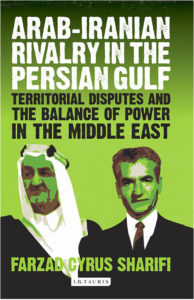
Arab-Iranian Rivalry in the Persian Gulf: Territorial Disputes and the Balance of Power in the Middle East
Farzad Cyrus Sharifi-Yazdi
I.B.Tauris (2014)
Rs13,741
Iranian ambitions in the Persian Gulf and rivalries with Arab neighbours are subject to intense - and heated - speculation, controversy and debate. Here, Farzad Cyrus Sharifi scrutinises the rival Arab-Iranian claims to Bahrain, the Shatt al-Arab waterway, and the Abu Musa and Tunbs islands in the years after World War II and before the Iranian revolution. Through investigation of previously unexamined primary materials and interviews with leading players, this book sheds new light on the evolution and dynamics of hegemonic and nationalistic Arab-Iranian rivalries and how these rivalries began to find symbolic expression through territorial disputes. Sharifi illustrates that these ongoing disputes - and the deep-seated tensions still prevalent in Arab-Iranian relations - are largely rooted in how they were constructed in the post-World War II period, making this book vital reading for researchers of the politics, history, international relations and diplomacy of the Middle East.
Farzad Cyrus Sharifi holds a PhD in Geopolitics, Territory and Security from Kings College London.
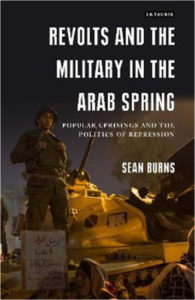
Revolts and the Military in the Arab Spring: Popular Uprisings and the Politics of Repressions
Sean Burns
I.B.Tauris (2018)
Rs14,474
Through detailed exploration of events in Tunisia, Egypt, Bahrain, Libya, Syria and Yemen, Sean Burns here breaks down the concept of professionalism within the armed forces into its component parts and demonstrates how variation in military structures determines their behaviour. In so doing, and by emphasising historical context and drawing on a wide range of political science theory, Burns sheds fresh light onto the ways in which military structure affects the potential for democratic transition or the course of civil war. With this book he presented a wide-ranging study of the Middle East which provides key tools to understanding the opportunities for democratisation, both during the Arab Spring and beyond, and which is therefore essential reading for anyone working on the Middle East, popular uprisings and the politics of repression.
Sean Burns received his PhD from Northwestern University in Illinois and is currently a visiting assistant professor at the College of William and Mary. He has previously published in peer-reviewed journals and presented at conferences internationally on military structures and many other areas of Middle East politics.
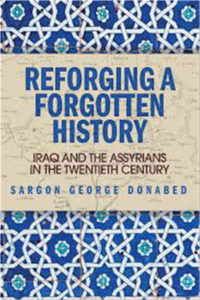
Reforging a Forgotten History: Iraq and the Assyrians in the Twentieth Century Reprint Edition
Sargon Donabed
Edinburgh University Press (2016)
Rs3,662
Who are the Assyrians and what role did they play in shaping modern Iraq? Were they simply bystanders, victims of collateral damage who played a passive role in its history? Furthermore, how have they negotiated their position throughout various periods of Iraq’s state-building processes? This book details a narrative of Iraq in the twentieth century and refashions the Assyrian experience as an integral part of Iraq’s broader contemporary historiography. It is the first comprehensive account to contextualize a native experience alongside the emerging state. Using primary and secondary data, this book offers a nuanced exploration of the dynamics that have affected and determined the trajectory of the Assyrians’ experience in twentieth-century Iraq.
Sargon George Donabed is an assistant professor of History at the Department of History and American Studies at Roger Williams University in Bristol, Rhode Island. He is co-editor of The Assyrian Heritage: Threads of Continuity and Influence (Acta Universitatis Upsaliensis, 2012), Religion and the State: Europe and North America in the 17th and 18th centuries and The Assyrians of Eastern Massachusetts.
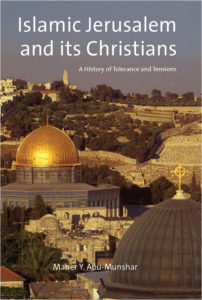
Islamic Jerusalem and Its Christians: A History of Tolerance and Tensions
Maher Y. Abu-Munshar
I.B.Tauris (2012)
Rs10,901
Islamic Jerusalem has a special place in the hearts of the three monotheistic religions. Throughout its history it has been the site of tolerance and tensions. ‘Islamic Jerusalem and its Christians’ presents a critical look at historical events during the time of two key figures in the history of Islam: Caliph ‘Umar Ibn Al-Khattab (d. 24 AH/ 644 CE), who played a critically important role in the birth and spread of Islam, and Sultan Salah al-Din (d. 589 AH/ 1193 CE) the legendary ‘Saladdin’ of Western Crusader lore, during and after the first and second Muslim conquests of Islamic Jerusalem. This pioneering study uses extensive primary research to explore Muslim treatment of non-Muslims in the 7th Century and in the Middle Ages, while also looking in detail at the situation of Christians in Islamic Jerusalem and their reaction and attitude to conquest.He analyses accounts of the communication between Salah al-Din and the Crusaders and the peace negotiations between Salah al-Din and Richard the Lion-Heart, King of England.
In doing so Abu Munshar counters many western and particularly orientalist writers who have portrayed Muslim treatment of Christians, after the first and second Islamic conquests, as similar to any occupation that Jerusalem has witnessed during its long history; that Islamic conquest in these two periods turned the life of non-Muslims into complete disarray. A valuable source of reference for all interested in Islamic and Middle Eastern studies, religion, medieval history and international relations studies, ‘Islamic Jerusalem and its Christians’ provides a fascinating insight into how Muslim tolerance of Christians was achieved in Islamic Jerusalem.
Maher Abu-Munshar is an assistant professor of Islamic History at Qatar University.
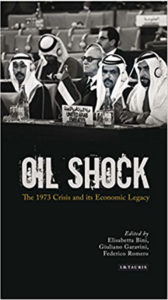
Oil Shock: The 1973 Crisis and its Economic Legacy
Edited by Elisabetta Bini, Giuliano Garavini, Federico Romero
I.B.Tauris (2016)
Rs12,642
The 1973 Oil Shock is considered a turning point in the history of the twentieth century. At the time it seemed to mark a definitive shift from the era of low priced oil to the era of expensive oil. For most Western industrialized countries, it became the symbolic marker of the end of an era. For many oil producers, it translated into an unprecedented control over their energy resources, and completed the process of decolonization, leading to a profound redefinition of international relations.This book provides an analysis of the crisis and its global political and economic impact. It features contributions from a range of perspectives and approaches, including political, economic, environmental, international and social history. The authors examine the origins of what was defined as an ‘oil revolution’ by the oil-producing countries, as well as the far-reaching effects of the ‘shock’ on the Cold War and decolonization, on international energy markets and the global economy. In doing so, they help place the event in its historical context as a key moment in the transformation of the international economy and of North-South relations.
Elisabetta Bini is a research fellow at the University of Trieste. She is the author of La potente benzina italiana: Guerra fredda e consumi di massa tra Italia, Stati Uniti e Terzo mondo (1945-1973) and the editor of Working for Oil: Comparative Social Histories of Labour in Petroleum (with Touraj Atabaki and Kaveh Ehsani).
Giuliano Garavini is a research fellow at the University of Padua and a senior research fellow at New York University, Abu Dhabi. He is the author of After Empires: European Integration, Decolonisation and the Challenge from the Global South, 1957-1986.
Federico Romero is a professor of History of Post-War European Cooperation and Integration at the European University Institute in Florence.

